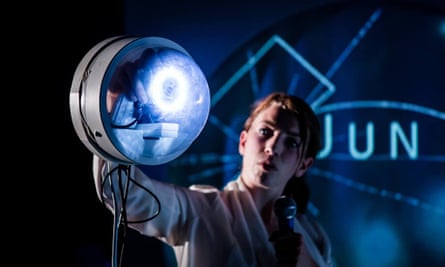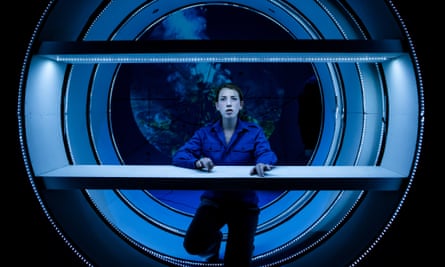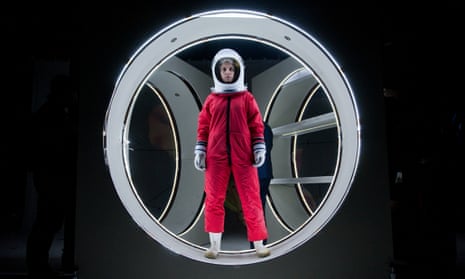From 2001: A Space Odyssey, to Gravity and Interstellar, cinema has a history of dramatising the intergalactic unknown.
But the vast and often mindboggling issues around human endeavours in space are now to make their way on to the usually resolutely earth-bound London stage.
Pioneer, which opened this week at Shoreditch Town Hall, is endeavouring to stretch the usual capabilities of theatre as it explores the first human mission to Mars, through characters that are both on this planet and floating millions of miles above it. It is particularly prescient timing, opening in the wake of Nasa’s discovery of liquid water on the red planet – considered the first essential ingredient to building life on Mars.
The multimedia play, which is the original work of science-focused theatre company Curious Directive, made its debut at the Edinburgh festival last year, where it was given the Scotsman Fringe First award.
Set in 2029, it is a piece of drama first inspired by the Mars One mission, the ambitious Dutch space project headed by entrepreneur Bas Lansdorp, which aims to land a manned spaceship on Mars and set up a human colony on the planet in the next decade or so.
“The idea was so outlandish and staggeringly ambitious that it got me interested, particularly in the people who drive the project and what their motivations are,” said the company’s artistic director, Jack Lowe, who first stumbled across the project during a talk at the Victoria and Albert museum over three years ago.
“A lot of people who talk about space travel talk about how we’ve lost that recklessness and belief in ourselves that motivated us to get a man on the moon, so the stage felt like a really interesting place to explore these complex questions around human progress.”

Together with his creative associate Russell Woodhead, whose master’s in psychology informed the play’s explorations of the human ability to cope with being in space, the pair consulted with astrobiologist Dr Lewis Dartnell for the production to fully inform the scientific and psychological complexities of such missions.
Dartnell said that despite the “enormous amount of hype” around the Mars One mission, he had explained to Lowe and Woodhead the scientific community’s doubts about the viability of the mission, where that left the future of human space travel and how an accurate script for Pioneer could be built around these scientific facts.
“As a space scientist I am not convinced Mars One will be successful but is absolutely along the right ideas,” said Dartnell. “The future of human space exploration is not national governments or government-funded institutions such as Nasa or the European space agency, it is private, independent corporations. They are becoming more and more important, so this is the kind of thing I discussed with Jack and Lewis and is what they explore in Pioneer: how is this possible and what kind of risks and dangers would those on board such missions face.”
The play, which the pair described as a thriller that pays homage to the great science fiction films, is told through three strands, including the story of a young Dutch couple who become separated on Mars, and a pair of Russian brothers who go on a road trip – driving a Lada Sputnik 1.3 – in search of the birth of space travel.
Woodhead said: “The failure of the first manned mission to Mars seemed to us like the best place to start our piece. By starting with failure, we hope we are setting up the question, how much would we be prepared to sacrifice to continue this? What are we prepared to give up to go to Mars for the sake of it? These are questions about exploration for the sake of it which humankind hasn’t had to answer for about 400 years.”
Both admitted it seemed like a daunting topic to tackle within the confines of the stage, particularly emulating as-yet untested conditions such as earth-out-of-view phenomena, which is the effect would it have on human psychology to no longer be able to see earth.

However, Lowe was adamant the theatre offered the audience a much more intimate and therefore tangible insight into the questions of human progress and identity at the heart of the mission to Mars.
Woodhead added: “With space travel, there’s not really a clear utilitarian purpose to this kind of science. When you are talking about going to Mars you are talking about doing something just because we can – simply to expand human race beyond its natural horizons – and that is fascinating and quite unexplored territory in theatre.
“We also started to think a lot about identity. When you are sitting in a small steel shell millions of miles from home, how will you keep hold of who you are and where you’ve come from? I think that’s probably the question we hit on that resonates most deeply with people watching.”
With the fictional mission to Mars funded by an Indian billionaire, the play also explores India’s increasingly important role in the future of space travel, illustrated recently by the Indian government’s recent investment in an orbiter around Mars that cost less than the budget of the film Gravity to build.
“Pioneer becomes an advocate for the capacity of theatre of tackle these big, traditionally filmic themes,” he said. “We can also ask less populist and more difficult questions than your traditional Hollywood blockbuster. I believe there is a real appetite in audiences to understand these issues and questions around space travel.”
Underwood said it was the polarising nature of space travel, both in terms of the billions of investment it requires and its necessity for human progress, that made it such a ripe issue to explore on the stage.
“I’m certainly pro-exploration for exploration’s sake but I don’t think I’d want to be the one doing the exploring,” he said. “So if I had the chance to go to Mars and die there, I think I’d say no. But that’s a personal choice; it is certainly not for everyone, and that’s why the stories of these people who make the decision they do want to go so fascinating.”
- Pioneer is at Shoreditch Town Hall, London, until 22 April

Comments (…)
Sign in or create your Guardian account to join the discussion